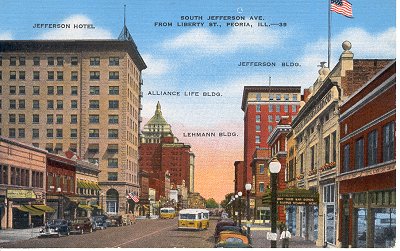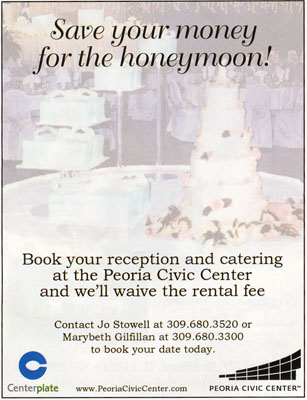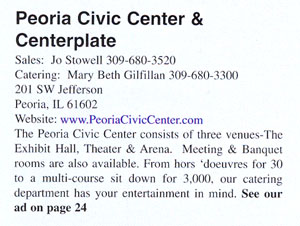John Morris was nice enough to come up to me during Tuesday’s city council meeting and compliment me on my blog. In return, I think it’s only fair that I point out Mr. Morris’s excellent observation that same night regarding the Civic Center hotel study.
Many people (council members, the Journal Star, and even I, myself) have expressed surprise over this hotel “crisis” that seems to have been sprung on us after the $55 million Civic Center expansion is almost completed. But Morris claims it shouldn’t have come as any surprise, at least to those on the council.
He referenced the “Peoria Civic Center Masterplan Analysis” study which was done in August 2002 (before the expansion was approved) by C. H. Johnson Consulting, Inc. I didn’t read feasibility studies on this stuff until I started blogging, which was only Spring 2005, so I’d never read this particular report. I was shocked. I’m going to quote heavily, so brace yourselves. It said (emphasis mine):
Despite the available occupancy in downtown hotels, Peoria is actually poorly positioned from an inventory standpoint to handle the needs of additional demand generators for three reasons; product quality, proximity of room inventory, and available room block. To effectively service a convention center and add value to the convention sales effort a hotel property must typically must be located within ten blocks (or reasonable walking distance) of a center, the property must be willing to commit approximately 60 percent of its room inventory to the convention center room block, and the hotel must offer a quality room product.
For the Peoria Civic Center, there are four hotel properties that have the potential to meet these criteria – the 288-room Hotel Pere Marquette, the 327-room Holiday Inn City Center, the 110-room Mark Twain, and the 108-room Staybridge Suites. At this time, however, the Staybridge chooses not to participate in the convention center room block, which removes it from consideration in the convention center package. The remaining three properties have a total inventory of 725 rooms, but none is located proximate the convention center. At two blocks, the Pere Marquette is the closest property, however, the property needs improvements in its quality. Given that Peoria is a cold-weather market, any distance beyond two blocks adds infinitely to the challenge of selling the center during winter months.
Under the assumption that 60 percent of the 725-room inventory in the three hotels is available, downtown Peoria can only offer a room block of 435 rooms. Even if the room block commitment is increased to 70 percent, only 507 rooms are available in the nearby properties. The lack of available rooms and their distance of many of the rooms from the PCC, means that many meeting planners and tradeshow promoters bypass Peoria as potential destination for their events, which translates directly into lost economic activity in the market.
Later in the report, they added (again, emphasis mine):
The Peoria Area Convention and Visitor’s Bureau tracks “lost†convention and meeting business. These are groups that that looked at the city, but ultimately decided to stage their events in another market because the PCC was either too small, the hotel room inventory in downtown Peoria was insufficient or not of the quality preferred by meeting planners, or other factors.
And, just to drive the point home, the Johnson report lists the responses from a survey of Illinois meeting planners on how they perceive Peoria as a place to hold events. One of the findings (emphasis mine):
When asked for suggestions with regard to improvements that could be introduced into downtown Peoria that would make the city a more attractive market, a common response was the need of a hotel to be connected to the convention center large enough to hold a group our size.
I keep quoting this stuff to point out that it wasn’t some isolated statement buried in the report. It came up over and over and over again. Under “Implications for Peoria,” toward the end of the report, they mention again, “as the city improves its downtown offerings and induces additional demand into the market, it must also improve its hotel offerings.”
But was it “critical” back in 2002? Yes — it even uses that exact word: “Critical the success of convention centers is the availability of proximate hotel rooms.” And look at this specific recommendation and see if it doesn’t sound familiar (emphasis mine):
…comparable facilities have a proximate hotel inventory (within three blocks) ranging from 700 to 1,000 hotel rooms, while the Peoria Civic Center has only the Pere Marquette’s 288 rooms nearby. With the recommended expanded and renovated facilities, Peoria will need a larger, higher-quality hotel package. In order to not only be competitive, but to accommodate more and larger groups, Peoria should consider:
- Connecting the Hotel Pere Marquette to the Peoria Civic Center via walkway, as is the case in many cities in the US….
- Inducing the development of an additional three-star hotel, such as the under-construction Hilton Garden Inn adjacent to the Kentucky Fair and Exposition Center in Louisville, Kentucky. …The City can help induce this development by providing a site, rebating property taxes, or any number of incentives.
- Promoting the upgrade of the existing hotel room stock in the city….
So, what’s my point? The Civic Center Authority and the City Council knew that this hotel deal was an integral part of the Civic Center expansion and that it was likely to need public funding. It shouldn’t have been a surprise to anyone who read the report. Nevertheless, the Civic Center tried to make the city believe that it could overcome that hurdle without adding to the $55 million price tag (see my previous post). That was wishful thinking at best, calculated deception at worst. Considering what was already known about how much comparable cities were spending to lure hotels to their areas, the city and Civic Center were naive if they thought Peoria could lure a hotel without any incentives.
So what do we do now? I recommend the city wait. Don’t react to this as if you have to build a new hotel tomorrow or the sky will fall. The Civic Center Authority told the council back in 2004, “We believe [the Civic Center expansion] can be successful without an attached hotel,” and did not request any public funding for a new hotel. I say, hold them to their word. What’s changed in the last two years? Nothing. They should be required to make a go of it without a penny more of public funding, just like they requested before this project started. It would be interesting to see what happens. It’s not like we can’t induce a hotel to locate here in the future if necessary.
The Holiday Inn will be under new management soon and is going to be undergoing renovations. Once the Civic Center expansion is done, presumably there will be some increase in the number of events, which will translate into more demand for hotel rooms. Let’s see what the free market does for a while. We might be surprised.

 Ever heard of those stories where a person buys a single new piece of furniture and then ends up redecorating the whole house around it? That’s kind of like what the Peoria Civic Center is doing these days.
Ever heard of those stories where a person buys a single new piece of furniture and then ends up redecorating the whole house around it? That’s kind of like what the Peoria Civic Center is doing these days.

